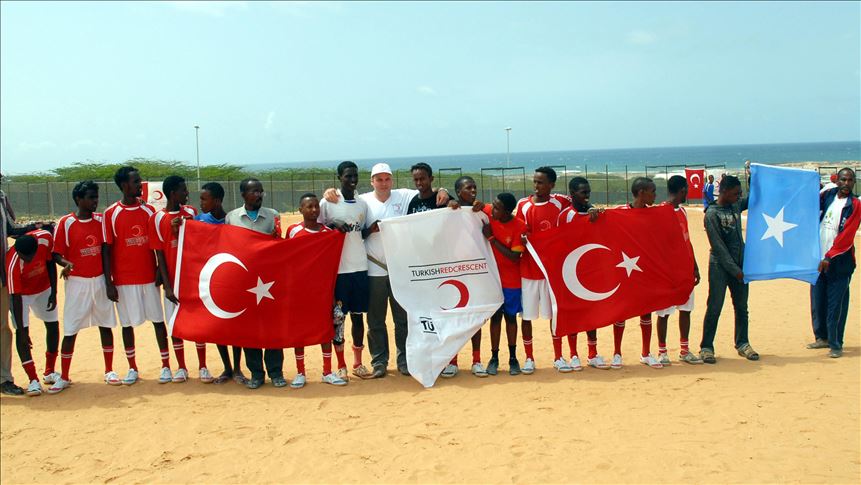Opinion Turkey is a nation which is football-mad. When it comes to passion for football, Turkish fans are among the most committed. Turkish football is watched all over the world from coffee shops in London to, now, across Somalia. Somalis, like Turks, are crazy for football.
On the streets, outside the mosques, on the beach and even on the roads during rush hour, one will always find Somali youth playing the beautiful game. Football gives the young an opportunity to be young, free and healthy in an often difficult environment. The football culture, among other things, is a strong bond that binds Turks and Somalis and could be capitalized on to take the people-to-people relations to the next level.
Somalia’s Football Association is still in its infancy and, despite public love for the game, there are very few places to play safely and for any official games to be played in. Turkish football teams, especially the “Big Three” (i.e. Galatasaray, Fenerbahce, and Besiktas), have a ready-made opportunity to make Turkish football big in Somalia and Africa in general.
Somali people have a great appreciation for Turkey because of the direct bilateral assistance they have received in aid, infrastructure, affordable health provision and educational scholarships from the Turkish government. The Somali business community have also developed strong links with their Turkish counterparts, with whom they enjoy profitable partnerships in many cases. This has helped to strengthen the people-to-people relations, which has allowed for regular engagement and dialogue between the two sides. Accordingly, Turkish football, which needs new markets like every other football association, should, in our opinion, try to benefit from and build on the current level of relations by investing in Somalia.
The kind of investment we are talking about is not to build a new national stadium, sponsor the Somali Football Association, or even play matches in Somalia; but those Turkish football teams that are financially capable could open training academies and build small local football grounds where young talents can come together and meet, and communities can enjoy the game together. This would be an excellent example of corporate social responsibility and a great opportunity to raise brand awareness for Turkish clubs in one of the youngest football-obsessed populations in Africa, and perhaps even find the next great international footballer among the Somali population, thereby giving a further boost to the popularity of Turkish football.
Somalia has an exciting history of competing in sports and is currently on the road to recovery, following decades of instability. With the determined efforts of the Somali people and the international community towards this end gaining momentum, the country’s football industry is also showing signs of revival. For instance, Stadium Mogadishu — the country’s biggest football field, once a big sports home that hosted international tournaments — is being renovated by the government to uplift the standards of the sport in the country. A number of other pre-civil war monuments have also seen the light of day. The newly renovated stadium could serve as an opportunity for Turkish football clubs to tap into.
Also important to mention is that Somalia is a nation of athletes. It has produced world-class figures, including Abdi Bile and Mohamed Farah among others. However, the athletics sector in Somalia, sadly, failed to survive the collapse of the state in the early 1990s, but it, too, could serve as a potential investment opportunity for the Turkish Athletic Federation and other privately owned athletics leagues.
Turkish football clubs’ investment in the sport in Somalia will pay huge dividends commercially and have an enormous effect on the security, well-being and economy of Somalia. Accordingly, Turkish football clubs have a golden opportunity to become pioneers that FIFA and individual football leagues could follow in the future. Additionally, investing in Somalian football would complement the Turkish government’s efforts to strengthen relations with African countries, thus further advancing Turkey’s win-win approach towards the continent. From a “Hopeless Africa” in 2000, to “Africa Rising” in 2011 and, now, to “The new scramble for Africa” — as they were dubbed by The Economist magazine –, there is every reason to believe that Africa is going through an enormous transformation and its future looks promising. The young and enterprising population, the economic growth and the expanding trade are all signs that epitomize a hopeful tomorrow for Africa and vast opportunities for investment.
Turkish football teams, so to speak, have an opportunity to score a beautiful goal in Somalia. Such an investment would mean new fans and viewers, a better brand recognition through corporate social responsibility and an opportunity to build on the strong bonds of friendship that already exist between the Somali and Turkish nations. In this regard, Somalia is an open goal for any great team waiting to score big in terms of greater brand recognition. It is time Turkish football clubs visited Somalia to see the talents and opportunities that abound there.
Source: AA.com
Liban Obsiye and Abdinor Dahir





